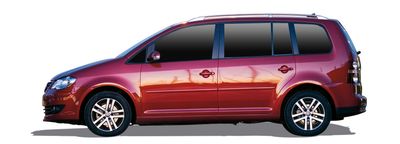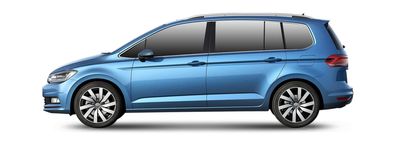Table of Contents
VW Touran engines
Since its launch in 2003, the VW Touran has established itself as a versatile compact van, offering a sophisticated range of VW Touran engines across three generations. Each generation brought with it new drive technologies and different strengths, with the development leading from classic naturally aspirated engines to modern turbo and hybrid drives.

VW Touran engines: Generation I (2003-2015)

The first VW Touran generation was characterized by the transition period between classic naturally aspirated engines and modern turbo units. Mileage varied considerably depending on the engine type: while the tried-and-tested TDI diesels easily reached 350,000 to 450,000 kilometers with proper maintenance, the early TSI petrol engines showed the first signs of weakness in the timing chain or turbocharger between 100,000 and 150,000 kilometers. The TSI engines introduced from 2007 in particular suffered from the teething troubles of the first turbo generation. The absolute top engine of this era was the 2.0 TDI with 170 PS, which optimally combined power, reliability and low consumption and proved to be the ideal family engine.
VW Touran petrol engines: Generation I (2003-2015)
The VW Touran petrol engine range started with classic naturally aspirated engines such as the 1.6 FSI (115 PS) and 2.0 FSI (150 PS), which were reliable but thirsty. From 2007, the first TSI turbo engines were added: the 1.4 TSI with 140 PS and later 170 PS as well as the 1.8 TSI with 160 PS. These VW Touran TSI engines offered significantly more power with lower fuel consumption, but suffered from typical problems of the early TSI generation. Timing chain problems, increased oil consumption and turbocharger damage made them the most problematic engines of this generation. The 1.4 TSI with twincharger technology (turbocharging and supercharging) was particularly susceptible to defects in the complex charging system.
VW Touran diesel engines: Generation I (2003-2015)
The tried-and-tested 1.9 TDI with outputs of 90 to 105 hp dominated the VW Touran diesel engines in the early years (2003-2009). At the same time, the more modern 2.0 TDI with 136 hp and later 140 hp and 170 hp was introduced from 2005. The VW Touran 2.0 TDI with 140 hp developed into the most reliable and popular engine of the entire generation. These VW Touran TDI engines with pump-nozzle injection proved to be extremely durable and economical, with a test consumption of only 5.2-5.8 liters per 100 km. From 2009, common-rail versions with particulate filters were added, which were quieter and cleaner, but occasionally had problems with exhaust gas recirculation.
| Engine | Power output | Fuel consumption | Typical weaknesses | Rating |
|---|---|---|---|---|
| 1.6 FSI | 115 HP | 7.8-8.5 l/100km | High consumption, sluggish | Average |
| 2.0 FSI | 150 HP | 8.2-9.1 l/100km | Thirsty, but robust | Average |
| 1.4 TSI | 140-170 PS | 6.5-7.8 l/100km | Timing chain, twincharger problems | Problematic |
| 1.8 TSI | 160 HP | 7.1-7.9 l/100km | Oil consumption, turbocharger | Moderate |
| 1.9 TDI | 90-105 HP | 5.0-5.6 l/100km | Loud, but reliable | Good |
| 2.0 TDI | 136-170 HP | 5.2-5.8 l/100km | Very robust, economical | Very good |

VW Touran engines: Generation II (2015-2022)

The second VW Touran generation marked a significant leap in quality in engine technology and is considered the most balanced of all generations. With proper maintenance, most engines of this generation easily reach 280,000 to 380,000 kilometers, whereby the 2.0 TDI diesel engines continue to be considered particularly durable. The TSI petrol engines showed significant improvements over the first generation, even if the powerful 2.0 TSI continued to have occasional oil consumption problems. The absolute highlight was the 1.5 TSI with 150 hp, which is considered one of the best VW Touran engines of all time - it perfectly combined reliability, efficiency and sufficient power for everyday family life.
VW Touran petrol engines: Generation II (2015-2022)
The VW Touran petrol engine range was completely revised and consisted exclusively of TSI turbo engines. It started with the 1.2 TSI (110 PS), which was quickly replaced by the more modern 1.0 TSI (115 PS). The heart of the range was the 1.4 TSI with 125 PS and 150 PS, which was replaced by the 1.5 TSI with identical power levels from 2017. These VW Touran TSI engines proved to be significantly more reliable than their predecessors, with only occasional problems with valve coking. For sporty drivers, there was the VW Touran 2.0 TSI with 190 hp, which, however, was still prone to increased oil consumption and proved to be the most problematic engine of this generation.
VW Touran diesel engines: Generation II (2015-2022)
The VW Touran 2.0 TDI (EA288) was offered in two power levels: 115 hp and 150 hp. Both variants had modern common-rail injection with SCR catalytic converter and particulate filter to meet the Euro 6 standard. The VW Touran 2.0 TDI with 150 hp proved to be the most reliable and efficient engine of this generation, with a test consumption of only 4.1-4.7 liters per 100 km and high reliability. These VW Touran TDI engines showed only occasional problems with exhaust gas recirculation and the AdBlue system, but were overall very robust and ideal for frequent drivers.
| Engine | Power output | Fuel consumption | Typical weaknesses | Rating |
|---|---|---|---|---|
| 1.0 TSI | 115 HP | 5.2-6.1 l/100km | A little weak for Touran | Average |
| 1.2 TSI | 110 HP | 5.4-6.3 l/100km | Not very common | Average |
| 1.4/1.5 TSI | 125-150 HP | 5.6-6.8 l/100km | Occasional valve coking | Very good |
| 2.0 TSI | 190 HP | 6.8-7.6 l/100km | Oil consumption, piston rings | Problematic |
| 2.0 TDI | 115-150 HP | 4.1-4.7 l/100km | EGR problems, AdBlue system | Very good |

VW Touran engines: Generation III (2022-today)
The current VW Touran generation relies entirely on electrification and represents Volkswagen's modern drive strategy. All petrol engines are now equipped with mild hybrid technology, and for the first time there is also a plug-in hybrid for the Touran. As this generation has only been on the market since 2022, there is no long-term experience yet, but the initial tests show promising approaches. The top-of-the-range engine is the 1.5 eHybrid with 218 PS system output, which combines sporty driving performance with high efficiency. The mild hybrid technology promises a service life of over 300,000 kilometers, as the electric support relieves the combustion engine and ensures more even load distribution.
VW Touran mild hybrid petrol engine: Generation III (2022-today)
The VW Touran engine range is based on two 1.5 eTSI engines with 96 kW (131 PS) and 110 kW (150 PS). Both VW Touran engines feature 48-volt mild hybrid technology with belt starter-alternator and cylinder deactivation at low load. The VW Touran 1.5 eTSI with 110 kW (150 PS) is considered to be particularly successful and is developing into the best engine of this generation - it offers smooth power delivery over a wide engine speed range, has so far been free of major series production problems and achieves a test consumption of just 5.8-6.4 liters per 100 km.
VW Touran plug-in hybrid: Generation III (2022-today)
The VW Touran eHybrid offers a system output of 160 kW (218 PS) with an electric range of up to 65 km. This VW Touran engine combines a 1.4 TSI with an 85 kW electric motor and offers excellent efficiency in city traffic. The technology is complex but reliable so far, with only the DSG gearbox occasionally showing sluggish shifting behavior when switching between electric and combustion modes.
VW Touran diesel engines: Generation III (2022-today)
Two VW Touran 2.0 TDI engines (EA288 evo) with 110 kW (150 PS) and 142 kW (193 PS) are available and continue the tradition of reliable VW Touran diesels. Both variants feature modern exhaust gas purification with SCR catalytic converter and twin dosing system for low emission values. The VW Touran 2.0 TDI with 150 hp remains the favorite for frequent drivers and offers a test consumption of only 4.2-4.8 liters per 100 km.
| Engine | Performance | Fuel consumption | Typical weaknesses | Rating |
|---|---|---|---|---|
| 1.5 eTSI | 131-150 HP | 5.8-6.4 l/100km | No series problems so far | Very good |
| 2.0 TDI | 150-193 HP | 4.2-4.8 l/100km | Robust, proven | Very good |
| 1.4 eHybrid | 218 HP | 1.4 l/100km + electricity | Sluggish DSG, complex | Good |

Conclusion: The best VW Touran engines of all generations
The development of the VW Touran engines clearly shows the technological progress over three generations. While the VW Touran diesel engines have consistently impressed with their high reliability and low fuel consumption, the petrol engines have evolved from problematic early TSI engines to modern, efficient mild hybrid drives. The new electrification of the third generation promises a promising future for drivers who value efficiency and environmental friendliness.
- Best VW Touran gasoline engine:
The VW Touran 1.5 eTSI (150 PS, Generation III) combines modern mild-hybrid technology with high efficiency and excellent reliability to date - ideal for modern everyday family life.
- Best VW Touran diesel engine:
The VW Touran 2.0 TDI (150 PS, Generation II & III) offers the best combination of reliability, economy and everyday usability across all generations and remains the favorite for frequent drivers.
- Best VW Touran hybrid engine:
The VW Touran 1.4 eHybrid (218 PS, Generation III) with its electric range of up to 65 km and low fuel consumption - perfect for commuters and environmentally conscious families.
For maintenance and spare parts for all VW Touran generations, AUTODOC offers a comprehensive range of original and quality spare parts with fast delivery and expert advice.
TOP Products on the topic:















